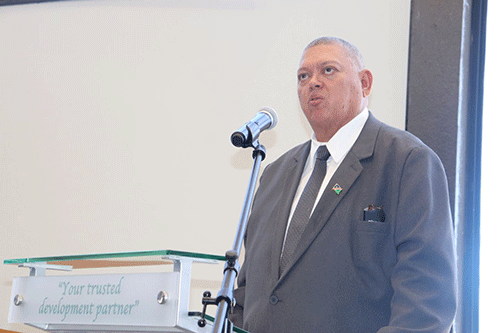WALVIS BAY – Walvis Bay will soon be graced by a state-of-the-art fishing school that will not only provide training to Namibian youth but will change the dynamics and education aspect of the industry and at the same time explore the wealth of the blue economy.
Founder of the initiative and former Walvis Bay Urban constituency councillor Knowledge Ipinge on Saturday launched the Fishing School magazine, an initiative aimed at raising funds for the fishing school that will be located in Kuisebmond.
The magazine’s first edition was funded by the Benguela Current Commission and is part of the entrepreneur’s commitment to bring innovative and diverse technical vocational education training to prepare the Walvis Bay community for continued growth as well as jobs for the future.
Ipinge and his two partners, Harold Davids and Francoise Botha, who both have extensive knowledge and qualifications within the fishing industry, spearhead the training institution.
According to Ipinge, they are briefing the relevant authorities such as the Namibia Training Authority (NTA), Namibia Qualifications Authority (NQA) to finalise the necessary accreditation to include their courses in the National Skills Development Plan for Vocational Education and Training.
“Our training institution will start with courses for which strong revenue potential exists and then add on lower-margin programmes once a solid revenue base has been established. We are in the process of raising at least three years of committed funding from potential investors and funders before progressing,” he explained.
Ipinge added that the money will not necessarily be raised in advance but could come as a commitment to the Walvis Bay Fishing School originating mainly from companies social investment reserves.
“Regardless of the source of funds, we understand that developing an institute is a long-term prospect that shouldn’t be dependent upon year-to-year financial decision making,” Ipinge explained.
Davids said the target group is those working at sea with no formal education that cannot specialise or get a promotion since they do not have formal qualifications.
“We are looking at those that did not complete their formal education or qualify for university as well as those with a wealth of experience without any qualification,” he said.
Botha said they have already secured simulations from Wartsila Corporation that will be used to train students.
They are going to provide the fishing school with a simulator with a complete ecosystem for marine navigation and communication engineering fishing in offshore solutions. The purpose is for market requirements as the market requires someone that has the qualification and knows exactly what to do when things don’t go as planned,” Botha said.
He added that with the simulator, the students will know how to react when facing a real life situation at sea before they even set foot in a real vessel.
The trio will be teaming up with international partners such as Dove Air which specialises in unmanned aerial drones to develop a drone research development hub.
They will also collaborate with Archipelago Marine research that works with fishing industries and regulators to implement sustainable practices through observer programmes.
Presidential economic advisor James Mnyupe, who also attended the event, applauded the trio for being innovative by tapping into the ocean economy.
“The Walvis Bay Fishing School is a massive enabler and a huge investment for Walvis Bay as well as the country. Namibia overall wants to champion the blue ocean economy that does not only focus on fishing but various other aspects that can bring both revenue and employment for the country,” he said.



